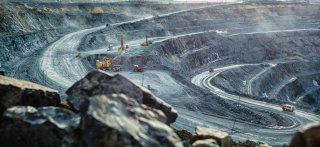America Faces a Rare Earth Element Crisis
Rare earth elements will power the future economy, but the United States still needs to do more to secure them.
From wind turbines to electric vehicles, rare earth elements—rare earths for short—are needed for key technologies to transition to a sustainable energy revolution. In addition, rare earths power modern military technology, such as radar systems and precision-guided munitions. Furthermore, as technological advancements continue in these areas, companies will need more rare earth for future technologies to function.
The Chinese government has committed tremendous financial and political resources to control the global rare earth elements market. These actions have yielded great dividends for the Chinese economy, which now controls 85 percent of the global rare earth processing market. With decades of financial and institutional support, Chinese refining businesses have developed the technology and skills to refine rare earth at a far lower price than the United States and other countries.
It is alarming that China is willing to leverage its rare earth monopoly to accomplish its foreign policy objectives. After the Japanese government detained a Chinese fish trawler due to an ongoing border dispute, China responded by embargoing its rare earth supply to Japan. Japan, which had imported 30 percent of its rare earth elements from China, was eventually forced to release the fishing captain back to China so that they could have a supply of rare earth. During the ongoing trade war, China has threatened to restrict rare earth exports to the United States.
To counter this threat, former President Donald Trump signed an executive order to increase the domestic production of rare earth for military technology. The Biden administration has also noted in its 2023 Annual Threat Assessment that China’s dominance in the critical minerals market “could pose a significant risk to U.S. and Western manufacturing and consumer sectors if the Government of China was able to adeptly leverage its dominance for political or economic gain.” The Biden administration has devised a few policies to diminish China’s dominance in the rare earth market. Notably, U.S. Defense Department has granted $10 million to MP Materials Inc, one of America’s rare earth mines. Furthermore, President Joe Biden signed executive order 14051 to ensure an adequate stockpile of rare earth for national security purposes. However, these policies are equivalent to shuffling deck chairs on the Titanic, as they are inadequate in addressing China’s current dominance.
The timeframe for Biden’s current investments in mining and extraction will take too long to materialize. A study found that rare earth mines from 2010 to 2019 took over sixteen years from initial discovery to production. The process takes this long because it typically takes twelve years to conduct feasibility studies of potential mining locations, followed by four years of construction. The urgent shortage of rare earth elements means the United States cannot rely on opening new mines and immediately seeing current problems disappear.
To address this, the Biden administration should also continue to invest in businesses that can efficiently decrease their dependence on rare earth elements. Following the 2010 Senkaku boat collision incident, the Japanese government began investing in rare earth recycling and electric vehicle battery production that did not require rare earth to function. The United States should take notes and needs to continue to invest in businesses dedicated to decreasing its dependence on rare earthsWhile many U.S. startups will fail, just a few startups surviving in the market will provide the U.S. with the ability to diminish China’s concentration and leverage in the rare earth market.
Most importantly, the Biden administration must recognize and prioritize the rare earth elements it needs to ensure national security. In a recent congressional hearing about U.S. energy policy, Interior Secretary Haaland stated that the administration is currently “identifying those critical minerals within the U.S. Geological Survey.” Not all rare earth are created equal. Some rare earth, like yttrium, is essential for munitions, while others, like neodymium, is more useful for powering electric vehicles. Given the time frame and the severity of the shortage, the Biden administration needs to prioritize this research. Only with an understanding of the type and quantity of certain rare earth can the Biden administration devise the optimal rare earth policy for the United States’s economic and national security.
Rare earth elements have propelled the global economy. The nations that control rare earth element refining capabilities will be able to determine the future environmental, economic, and military capabilities of their country and its allies. In 1992, while visiting a Chinese Rare Earths Research Institute in Baotou, Deng Xiaoping famously stated that “there is oil in the Middle East; there is rare earth in China.” America’s leaders must share the same attitude that Deng had for China.
Richard Li is an undergraduate student at Cornell University. He can be contacted at [email protected]. Follow him on Twitter @RichardLuLi1.
Image: Shutterstock.

